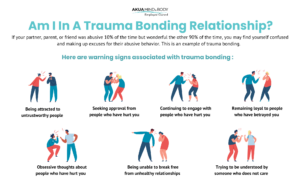If your partner, parent, or friend was abusive 10% of the time but wonderful the other 90% of the time, you may find yourself confused and making up excuses for their abusive behavior. You may tell yourself and others that you still love them and they are wonderful people despite their abuse. You have invested so much time, energy, and love into the relationship and do not want to leave this person. This is an example of trauma bonding.
Trauma bonding defined
Trauma bonding is a term used heavily on social media and the internet but often used incorrectly. It is an unhealthy attachment you have to your abuser or to another person who treats you poorly. You have sympathy for them, regardless of how horrible they treat you. People who are in trauma bonds often have a history of being abused either as a child or in their earlier years, and you unconsciously re-enact this pattern of early attachment to the abuser. Children cannot prevent being abused, and they often blame themselves and, as a result, will do anything to please or grow closer to their abuser, who is often their caretaker. As this child grows up, they may find themself attached to people who show forms of abuse towards them as a way to re-enact this pattern of attachment.
Trauma bonding can also occur when two people who share past trauma experiences bond to each other over this shared experience and create a re-enactment of the original dysfunctional attachment pattern within their relationship. It’s as if these two people are tethered to each other with invisible ropes within a cycle of negativity and dysfunction. This can be seen between platonic friendships or within romantic relationships and is often falsely portrayed on social media as “immediate best friends.”
You may find yourself wondering, “Why do I hold onto or seek out relationships that harm me rather than uplift me”?
“Why does love feel more like a prison than a partnership?”

So why does this happen?
As humans, we are hard-wired from birth to find comfort in an attachment figure when we feel threatened. In childhood, this is usually our parents or our caretakers. In adulthood, these are usually our romantic partners. This occurs even if our caretakers or romantic partners are the ones threatening or abusing us. We turn to the ones closest to us even when they are abusing us, which leads to us feeling bonded to them. We tend to try to make sense of the abuse and rationalize how they can love us but still abuse us. This rationalization further strengthens the trauma bond. Our abusers may apologize and make empty promises to us when we are most vulnerable, leaving us feeling even more strongly connected to them. With repeated trauma comes repeated patterns of relating to others, meaning that we may seek out individuals who have abusive tendencies because that is what we have been familiar with since childhood. Our nervous system has come to associate a degree of stress and adrenaline with affection, love, arousal, and familiarity. Our inner child may be trying to relive to fix old, painful ways of relating.
However, not everyone who experiences abuse develops a trauma bond. Trauma bonds are more likely to occur if there is some form of attachment or dependence associated with the abuser, such as if they are the sole financial provider or are the caretaker or you rely solely on this person for comfort or support, meaning that you do not have a healthy network of friends outside this relationship. Trauma bonds are more likely to occur when there is a perpetuating cycle of abuse, such as abuse, remorse, kindness, and repeat, within the relationship.
It is possible to break this cycle, but first, you must recognize that you are in an unhealthy relationship and have the desire to break free. A therapist with experience in trauma can help you identify the underlying reasons why you engage in unhealthy attachments and can help you work through these past triggers and traumas. The goal is to recognize these patterns and develop coping skills to prevent entering into an unhealthy attachment.
Warning signs associated with trauma bonding
- Obsessive thoughts about people who have hurt you
- Seeking approval from people who have hurt you
- Continuing to engage with people who have hurt you
- Remaining loyal to people who have betrayed you
- Being attracted to untrustworthy people
- Being unable to break free from unhealthy relationships
- Trying to be understood by someone who does not care
Is this the same as co-dependent relationships?
Codependency is also an unhealthy attachment pattern and a specific type of trauma bond where one person is so focused on meeting the needs of the other that they loses their sense of happiness and self-worth. Codependency is a rescuer-victim relationship and can be deeply intertwined in trauma bonding. An individual in a trauma-bonded relationship who is being abused may not only be attached to their abuser due to the deep emotional trauma they have endured but also may prioritize their abuser’s needs over their own. They may feel they can find self-worth by “helping” their abuser.




